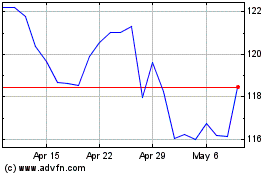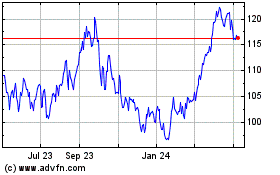Three of the largest U.S. banks, in a joint appeal to the
Treasury Department, warned that proposed tax rules on internal
corporate debt could make their industry "more fragile in times of
financial stress" and end up "creating risk to the financial
stability of the United States."
Citigroup Inc., J.P. Morgan Chase & Co., and Bank of America
Corp. want industry-specific exceptions to the tax rules, which the
government wrote to prevent tax-motivated transactions known as
"earnings stripping."
The banks say their internal loans don't stem from tax
avoidance, but from legitimate needs to move their
inventory—money—around the world efficiently. In some cases, they
say, internal loans are driven by other government regulations.
"Making intercompany loans is fundamental to the ordinary course
of a global financial services business," the banks' letter says.
Under the rules, "a financial services group would face the choice
between, on the one hand, staggering administrative complexities
and a tax burden disproportionate to its true economic profit, and
on the other hand, the imposition of crippling constraints on its
ordinary business activities."
Those warnings follow concerns from dozens of businesses and
trade groups that say the rules would transform their finances in
punitive, cascading and unpredictable ways. In its waning days, the
Obama administration is facing tough, organized resistance to one
of its most consequential tax regulations, and not just from
foreign companies with the most to gain from earnings
stripping.
The big four global accounting firms asked the Treasury to
withdraw the rules and replace them with a more targeted effort,
citing "consequences that are severe and far-reaching in nature."
Exxon Mobil Corp. wrote that the regulations would disadvantage the
company against foreign competitors and require $30 million in
upfront compliance costs and $100 million annually. Verizon
Communications Inc. wrote that the rules would "unfairly penalize"
it for routine transactions.
Supporters include left-leaning nonprofit groups, a collection
of law professors and Sen. Bernie Sanders of Vermont, who wrote
that the rules "focus only on the most blatant abuses."
The government says it is listening, but the Treasury rebuffed
requests from lawmakers and trade associations seeking more time to
study the rules. The Internal Revenue Service will hold a public
hearing Thursday, one week after the comment deadline.
The Treasury says it will issue final rules "swiftly," with the
decision coming after officials are "satisfied that we have
addressed any reasonable concerns," the department said in a
statement Tuesday that didn't directly address the banks'
issues.
"Thus far," the statement said, "these comments generally fall
into a few categories of feedback, all of which we believe we can
respond to in the final regulations."
The rules under section 385 of the tax code are part of the
government's effort to halt corporate inversions, in which
companies cut their tax bills by putting their addresses outside
the U.S. Companies based abroad, inverted or not, can load U.S.
subsidiaries with debt payable to the parent company. They can
deduct interest against the 35% U.S. tax rate, shifting profits to
a lower-taxed jurisdiction. The rules attack earnings stripping by
reclassifying those debt instruments as equity investments, making
payments nondeductible.
Banking trade groups, including the Securities Industries and
Financial Markets Association and the American Bankers Association,
filed their own letters seeking industry-specific exemptions.
Sifma, which said the rules could have "potentially catastrophic"
effects, has met with the Treasury. Payson Peabody, the group's tax
counsel, said Treasury officials are aware of the concerns and
understand them. It isn't clear yet what Treasury will do.
"The existing 385 regulations will create undue hardship on the
banks. I don't think that a complete exclusion of them from 385 is
the answer," said Bret Wells, a University of Houston law professor
who added the government should focus on companies with excessive
leverage in the U.S.
Citigroup, J.P. Morgan and Bank of America—three of the four
largest U.S. banks by assets—wrote to emphasize their particular
concerns apart from the larger trade groups that often speak for
them but also represent other financial-services companies with
different interests. The banks' 24-page letter proposes specific
changes that would treat banks and broker-dealers differently from
other companies. Other Treasury rules already recognize those
differences, the banks write, and the reasons here are "especially
compelling."
The three banks submitted a joint comment on a different
international tax policy regulation last year. They repeated that
teamwork this time because they share a similar business footprint
and scale, said three people involved in developing the banks'
response.
According to the banks, existing regulations limit their ability
to erode the U.S. tax base. And, they write, regulators require or
encourage banks to have intercompany debt that can be moved around
the company to provide flexibility during financial stress.
The banks say their subsidiaries and branches make hundreds of
intercompany deposits daily. They may, for example, use debt to
move money from a Hong Kong subsidiary to New York and back to meet
customer demand. Internal loans also help banks manage
interest-rate risks, according to the letter.
Samuel Thompson, a tax-law professor at Penn State University
who supports the rules, said the banks make a good case for an
exception and that the government should consider adopting some but
not all of their recommendations.
Mr. Thompson said the government should exempt banks' ordinary
financial transactions from some rules but let the government
recharacterize other transactions as equity.
"They are a brilliant set of rules," Mr. Thompson said. "And
they need to tinker with them to make sure they don't become overly
onerous on non-tax-avoidance transactions."
Write to Richard Rubin at richard.rubin@wsj.com
(END) Dow Jones Newswires
July 13, 2016 13:05 ET (17:05 GMT)
Copyright (c) 2016 Dow Jones & Company, Inc.
Exxon Mobil (NYSE:XOM)
Historical Stock Chart
From Mar 2024 to Apr 2024

Exxon Mobil (NYSE:XOM)
Historical Stock Chart
From Apr 2023 to Apr 2024
